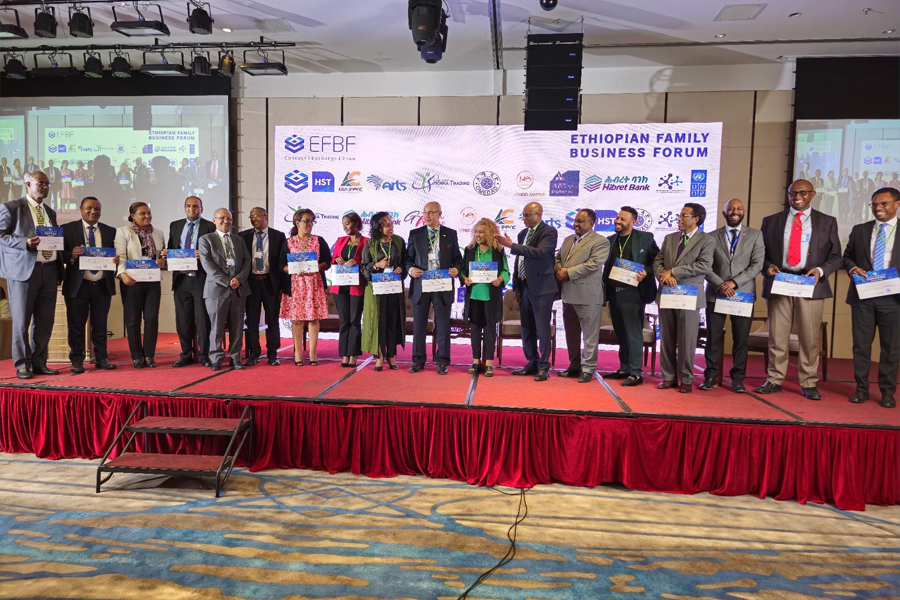
Radar | Jun 29,2025
“The key to our people's survival does not lie in weapons or wealth but in culture.” This quote, which resonated with me while watching a documentary, captures the essence of how societies endure across generations. In anthropology, culture is described as the lifeblood of a society—the software that drives societal functions through institutions like religion, economy, polity, education and family. It is what binds communities together and ensures continuity.
However, culture can also be fragile. In today’s globally connected world, one of the most effective ways to dismantle a society is to undermine its cultural values. Disruption of these values weakens the societal fabric, threatening its continuity. This may seem inevitable as globalisation accelerates, exposing societies to a constant influx of external influences.
In Addis Abeba, for instance, it is not uncommon to see Christmas trees during the holiday season—an image borrowed from Northern European traditions, specifically Germany. Alongside this, Santa Claus—a bearded figure who allegedly slips down chimneys to leave gifts—has also become a holiday fixture.
Growing up, I remember Christmas plays and carols in Amharic, although I only later realised that these were translations from English. Today, however, the holiday has taken on a more global, pop-culture meaning, shifting from its original religious context. Ironically, while these Western symbols of Christmas are increasingly embraced, traditional Ethiopian customs like Yegena Chewata (a hockey-like game played during the holiday) are fading from memory. The introduction of foreign customs has, in many cases, overshadowed the old ways, raising questions about what is being lost in this cultural exchange.
The allure of foreign cultural practices seems to lie in their novelty and accessibility through media, consumerism, and the internet. Some customs, like Mother’s and Father’s Days—celebrated on the second Sunday of May and the third Sunday of June, respectively—have been welcomed with open arms in Ethiopia. These days have found a place in social media circles and have become part of the family tradition, transcending cultural boundaries. What surprises me is how quickly these celebrations have become ingrained in society, as if they had always been there.
However, the appeal of these imported customs reflects deeper forces at play. Businesses play a major role in driving the adoption of foreign holidays. Valentine’s Day, for instance, has become one of the most pervasive cultural imports. In major cities, people now invest heavily in gifts, parties, and special dinners to mark the day. Hotels and restaurants capitalise on this by offering Valentine’s-themed events, transforming the day into a major economic driver. The commercialisation of such holidays shows how globalisation merges with consumerism to facilitate the spread of foreign traditions.
There are still cultural celebrations that remain largely confined to their original contexts, such as Thanksgiving in the U.S. While Thanksgiving may be tied to the specific historical experience of the Pilgrims in the New World, its core message of gratitude resonates across cultures. Some European countries and Canada have already adopted it, and it wouldn’t be surprising if it spread further in the coming years.
In Ethiopia, youth culture has increasingly embraced foreign traditions, especially during school graduation seasons. I recall during my high school days, students paraded down Churchill Road in elaborate costumes, face paint, and eccentric outfits. The “Crazy Day” tradition—where boys dressed as girls and vice versa—was a part of this spectacle, although its origins remain unclear. My son tells me this quirky tradition still persists today. Such moments demonstrate the extent to which foreign customs take root, especially among younger generations who are often the first to adopt global trends.
Graduation ceremonies, too, have become more elaborate, borrowing practices like yearbooks and prom nights from the West. These events are infused with a sense of finality, as if leaving high school marks the end of an era. Prom night, in particular, has transformed into a rite of passage, despite the anxiety some feel about finding a date or the cost of preparation. While these customs may seem frivolous, they are noteworthy markers of how deeply foreign cultural practices have been absorbed into Ethiopian life.
The influence of global media, particularly Hollywood, cannot be overstated. Films, books, and the internet have had a profound impact on how people dress, speak, and think. Hollywood, seen as an extension of U.S. soft power, has shaped mannerisms and values across the world. The late Alemayehu Eshete once recounted how, as a youth, he emulated cowboys in Western films—arriving on horseback, clad in a Levi’s jacket, cigarette in hand. This influence goes far beyond fashion; it permeates the global consciousness, altering perceptions and behaviours in every corner of the world.
But, there are exceptions. I admire West African countries for their steadfast commitment to traditional attire, a visible sign of their cultural identity. Their garments, vibrant and beautifully designed, are worn with pride, earning admiration worldwide. In many parts of the world, colonization stripped societies of their cultural identities, leaving lasting scars. Today, the soft power of media and music continues this erosion. However, in West Africa’s case, a clear sense of cultural preservation persists, proving that cultural continuity is possible even amid external pressures.
In Ethiopia, there are efforts to resist cultural erosion. On December 8, the country’s rich diversity is on full display during Nations, Nationalities, and Peoples Day. People gather in traditional attire, singing, and dancing in a vibrant display of unity. Schools also hold cultural days, where students perform traditional dances and songs, keeping the old ways alive. This shows that even in a rapidly globalising world, there are spaces where local traditions are nurtured.
Anthropology teaches us about cultural relativism—the idea that all cultures must be understood within their context. This mindset fosters empathy, mutual understanding, and peaceful coexistence in a world increasingly divided by differences. But cultural relativism also encourages us to reflect on which elements of external influence to embrace and which to resist. As globalisation presses forward, it is crucial to pause and consider the values that have sustained our societies.
The late Solomon Yirga (PhD), a renowned zoologist, exemplified the importance of retaining local culture in scientific and societal advancement. He translated Charles Darwin’s Origin of Species into Amharic and published his research on Ethiopian mammals in the same language. His work stresses the power of cultural preservation, even in academia. Language, after all, is one of the most powerful tools for maintaining cultural identity.
As we move forward, we must filter external influences, deciding what to absorb and what to reject. It is how we can safeguard the values that have sustained us for generations while embracing the changes that make us a part of a broader, interconnected world.
PUBLISHED ON
Oct 20,2024 [ VOL
25 , NO
1277]


Radar | Jun 29,2025

Sunday with Eden | Jun 21,2025

Agenda | Nov 27,2022

Agenda | Sep 22,2024

My Opinion | Jun 07,2025

Dec 22 , 2024 . By TIZITA SHEWAFERAW
Charged with transforming colossal state-owned enterprises into modern and competitiv...

Aug 18 , 2024 . By AKSAH ITALO
Although predictable Yonas Zerihun's job in the ride-hailing service is not immune to...

Jul 28 , 2024 . By TIZITA SHEWAFERAW
Unhabitual, perhaps too many, Samuel Gebreyohannes, 38, used to occasionally enjoy a couple of beers at breakfast. However, he recently swit...

Jul 13 , 2024 . By AKSAH ITALO
Investors who rely on tractors, trucks, and field vehicles for commuting, transporting commodities, and f...

Jul 5 , 2025
Six years ago, Ethiopia was the darling of international liberal commentators. A year...

Jun 28 , 2025
Meseret Damtie, the assertive auditor general, has never been shy about naming names...

Jun 21 , 2025
A well-worn adage says, “Budget is not destiny, but it is direction.” Examining t...

Jun 14 , 2025
Yet again, the Horn of Africa is bracing for trouble. A region already frayed by wars...